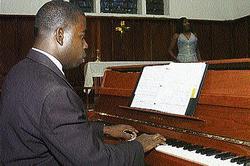Michael Reckord, Gleaner Writer

Pauline Forrest-Watson sings during 'A Classical Renaissance' at the University of the West Indies, Mona chapel, on Sunday.
Opera and concert singer, Pauline Forrest-Watson, gave more than a recital at the University Chapel on Sunday. Music dominated the programme, but there was much drama and 'heart' mixed in.
The latter took the form of a mimed performance by an actress portraying a young inner-city mother cowering in her home as gunfire blazes around her. She dies at the end of the poem, I Die Many Deaths, which was written by Forrest-Watson and read by her son, Michael Watson,an amateur actor.
Young Watson, who also read the programme notes preceding many of his mother's songs, was not the only family member performing. To the delight of the audience, husband, Dr. Curtis Watson, both sang and danced with her in a couple of items.
Three musicians accompanied her. The main one was pianist Roger Williams, currently director of the School of Music at the Edna Manley College of the Visual and Performing Arts, where Forrest-Watson is head of the Voice Department. His playing was superb throughout; the singer couldn't have asked for more sensitive, versatile support.
The one complaint one could make about Rafael Salazar, Professor of Music at Northern Caribbean University (NCU), who accompanied the singer on clarinet, was that we did not hear enough of him. While Forrest-Watson sang the words of Franz Schubert's Shepherd on the Rock, Salazar's playing helped to conjure up images of the title character.
Magical moment
The magical moment created by the musical duet between the two was enhanced by the setting - a soft, rain-washed evening in a chapel built of hewn rock, through the windows of which one saw gold-green lawns and, in the distance, blue-grey hills. Sheep could have been imagined either on the lawns or in the hills.
The Schubert item was the fourth of the seven songs with which Forrest-Watson delighted the regrettably small audience in part one of the programme. It was well placed, being a complex piece demanding good vocal range and coloratura efforts.
Forrest-Watson's performance on Sunday proved her to be the complete singer. She handled the comparatively serious first half with ease, portraying tragedy when needed (as in Vincenzo Bellini's Casta Diva, about a woman about to sacrifice herself to a goddess; and in Verdi's Pace Pace, featuring a woman faced with a death threat from her own brother); uncertainty and wonder (as in Rachmaninov's Coh (The Dream); an spirituality (as with the St. Francis of Assisi prayer,Lord, Make Me an Instrument of Thy Peace. Other songs in part one were Mozart's Alleluia and Rachmaninov's Cupehb (Lilac).
Enthusiastic applause

Roger Williams, on piano, accompanies Pauline Forrest-Watson at 'A Classical Renaissance' at the University of the West Indies, Mona chapel, on Sunday. - photos by Andrew Smith/Photography Editor
As is traditional with recitals and concerts, the second half offered lighter fares. The first item was the dramatisation of the poem, I Die Many Deaths and the second was a novelty song composed by Rossini. Comprising a series of cat sounds ('miaows'), it was 'sung' and acted out by Forrest-Watson and her husband, and drew enthusiastic applause.
Forrest-Watson changed character from a seductive cat to a little girl learning the alphabet in the next item, Mozart's ABC. Next she 'aged' rapidly to become a grandfather clock in Thomas F. Dunhill's composition of the same name.
The second pianist, Clive Barber, made his only appearance to accompany Forrest-Watson with the popular song, All of Me, for which she again assumed the role of a seductress.
'Brawta'
She ended her prepared programme with two more popular songs, Strangers in the Night and Climb Every Mountain, and a spiritual, Scandalise My Name. But, there was more to come.
A standing ovation motivated her to have a quick chat with pianist, Williams, and give a 'brawta' in the form of the folk song, Dry Weddah House. Then, because of the late arrival of the television crew that should have taped the show, Forrest Watson gave a reprise of Mozart's Alleluia.
As the more-than-satisfied audience filed out of the chapel, the television crew taped an appeal by Forrest-Watson on behalf of three sickle cell-afflicted children of the Currie family, 18-year-old wheelchair-bound Ricardo, and his sisters, aged 5 and 7. Forrest-Watson told the audience that it was the family's plight that had inspired the poem, I Die Many Deaths.

